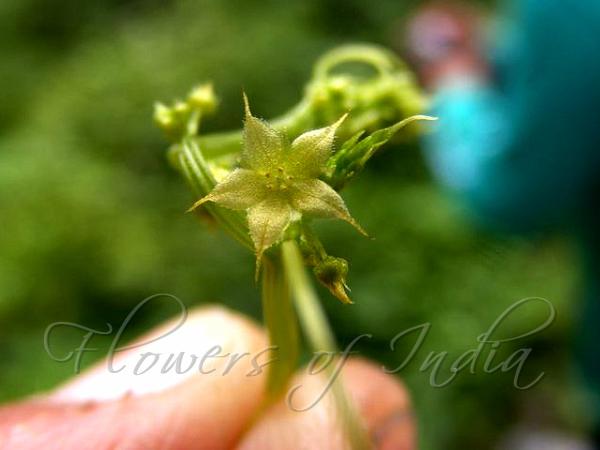|
| Ivy Gomphogyne |
|

|

| File size | 60553 |
| Original date | 8/16/12 3:00 PM |
| Resolution | 0 x 0 |
| Flash | Flash did not fire, auto |
| Focal length | 6.3mm |
| Exposure time | 1/45s |
| Aperture | 3.5 |
| Focus Distance | 0.0m |
| Metering Mode | Multi-segment |
| Camera make | FUJIFILM |
| Camera model | FinePix S5700 S700 |
| Sensor type | OneChipColorArea |
|
|
|
|
Photo: |
Botanical name: Gomphogyne cissiformis Family: Cucurbitaceae (Pumpkin family)
Synonyms: Gomphogyne cissiformis var. cissiformis, Gomphogyne alleizettei
Synonyms: Gomphogyne cissiformis var. cissiformis, Gomphogyne alleizettei
Ivy Gomphogyne is a climber with stem hairless or
slightly puberulent. Leaves are membranous; leafr-stalks 3-6 cm,
glabrous; leaflets obovate-oblong, glabrous, median leaflets 4-6 ×
1.5-2 cm, lateral leaflets shorter, base attenuate, margin
crenate-dentate, apex acuminate or acute; petiolules 3-9 cm. Tendrils
slender, 2-fid. Plants monoecious. Male flowers in racemes or panicles;
rachis slender, flexuous, 10-30 cm, glabrous; pedicels capillary-like,
often fasciculate, 1-3 mm, with bracteoles at base; calyx segments
narrowly ovate, 1-1.5 mm, acute; corolla segments ovate-lanceolate,
2.5-3 × ca. 1 mm, 3-veined, entire or indistinctly dentate. Female
flowers in panicles 5-12 cm, or fascicled in axils of leaves; pedicels
filiform, reflexed; bracteoles subulate; ovary funnelform. Fruit pale
green, turbinate, 12-16 × 8-11 mm, apex truncate, 3-longitudinally
dehiscent, 1-3-seeded. Seeds dark brown, oblong, 7(-12) × 3-4 mm, 1-2
mm thick, verrucose, base acute, margin dentate, apex truncate. Ivy
Gomphogyne is found in forests on mountainsides, in the Himalayas, in
Bhutan, India, Nepal, at altitudes pf 2100-2800 m.
| Identification credit: Nidhan Singh | Photographed on Gobindghat-Ghangriya route, Uttarakhand. |
• Is this flower misidentified? If yes,